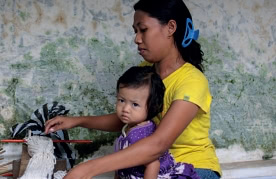Extending childcare services to workers in the informal economy: Policy lessons from country experiences
This brief presents a new typology of childcare services available to workers in the informal economy and their young children between 0-3 years old, based on primary research and a review of secondary sources.
Poor women in informal employment face two major obstacles: first, the dearth of quality childcare services for children between 0-6 years old across the global South; second, the prohibitive cost of these services, where they exist.
- Childcare services remain limited in much of the global South where the concentration of workers in the informal economy is highest. Data is scant, but of the 87 countries with available data, ILO estimates of enrolment rates in childcare services for children between 0-3 years old shows that 53 countries had gross enrolment rates below 20 per cent. The average global enrolment rate was 18.3 per cent.
- When childcare services are available, the main constraint identified by women workers in the informal economy is the services’ high costs. Their low and irregular earnings make it difficult to pay daily, weekly or monthly user fees.
This is the third of three policy briefs. WIEGO and ILO highlight both the urgent childcare needs of women workers in the informal economy and the demands for decent working conditions for childcare workers and domestic workers – most of whom are women working in the informal economy.
See also:
- Policy Brief 1: Quality childcare services for workers in the informal economy
- Policy Brief 2: Labour and human rights frameworks promoting childcare for all worker
Also available in:
View list of all: Research Reports


